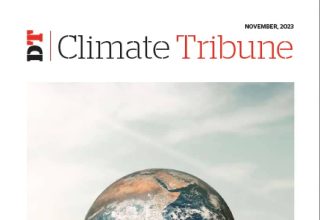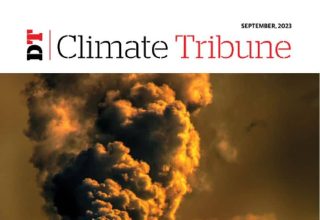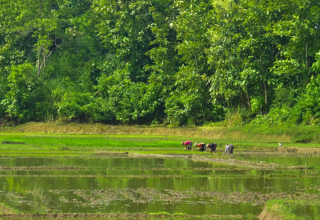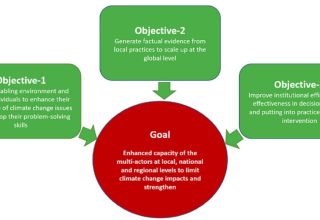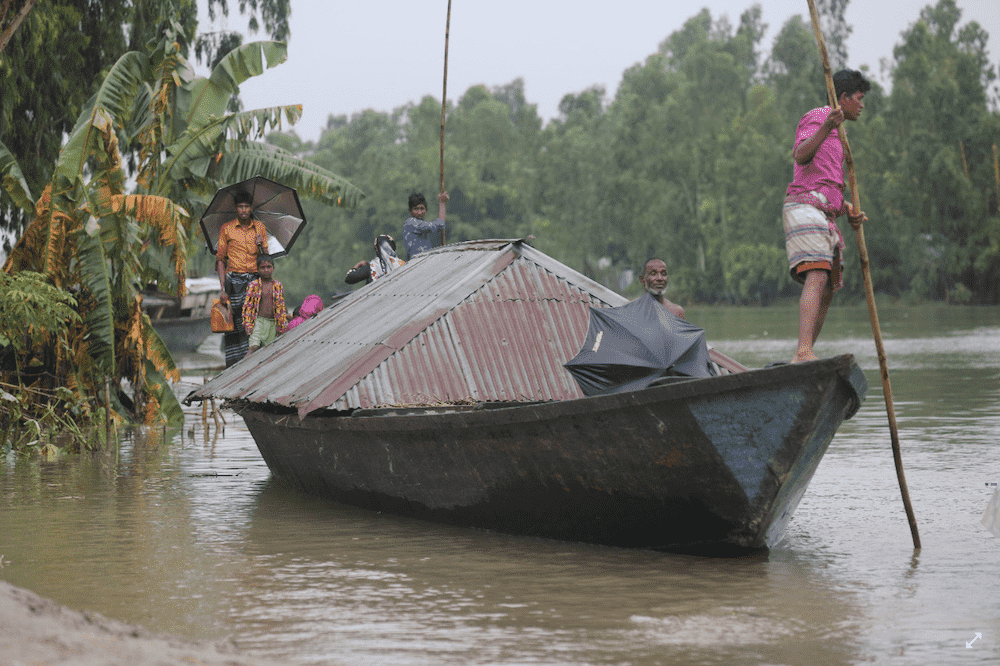
Bangladesh is one of the most vulnerable countries due to climate change impacts. The low-lying land at the end of one of the world’s largest river delta systems makes Bangladesh more prone to natural disasters, like flash floods, monsoon floods, landslides, cyclones, storm surge, salinity intrusion, drought, and unpredictable rainfall.
According to the Global Climate Change Risk Index, over the period 1998-2017, Bangladesh ranked ninth among the countries most affected by climate change-induced natural disasters. As per the World Bank, since the past 40 years, the average GDP loss due to climate disasters has been from 0.5% to 1% annually. The Government of Bangladesh (GoB) already invests about Tk25,000 crore — close to $3 billion a year for addressing climate change impacts. Nonetheless, the international finance support for climate change adaptation (CCA) is minimal and has the opportunity to scale up.
Legal and policy framework on climate finance
The Government of Bangladesh (GoB) has adopted a wide range of policies and mechanisms at macro and sectoral levels to tackle climate change. Currently, Bangladesh is developing its National Adaptation Plan (NAP). While Bangladesh was one of the first least-developed countries (LDCs) to develop its National Adaptation Program of Action (NAPA) in 2005, it did not have a financing strategy.
Bangladesh Climate Change Strategy and Action Plan (BCCSAP) was adopted to mainstream climate actions in its economy and society, and it has been updated, which the GoB will adopt soon. The Climate Fiscal Framework (CFF) was adopted in 2014 to model the country’s Public Financial Management (PFM) system as climate inclusive. It was updated in 2020.
In 2015, the Nationally Determined Contribution (NDC) was submitted and updated in 2021. The Perspective Plan (2021-2041) and the 8th Five Year Plan, Annual Development Plans, and other sectoral plans integrated climate change actions.
Landscape of National Adaptation Finance
Climate Change Trust Fund (CCTF): Against the backdrop of the inadequacy of climate finance from multilateral and bilateral sources, the Government of Bangladesh created the Climate Change Trust Fund (CCTF) in 2009 from its revenue. It also enacted the Climate Change Trust Act 2010 to provide CCTF with a legal footing.
The CCTF was created to combat climate change impacts and implement Bangladesh Climate Change Strategy and Action Plan (BCCSAP), 2009, undertaking projects based on the thematic areas and programs mentioned in BCCSAP. Up to FY 2020-21, CCTF received a total allocation of Tk4,100 crore, and till December 2021, a total of 800 projects under CCTF have been approved.
The Government Ministries/Divisions are implementing 462 projects while different NGOs are implementing the remaining 63 projects under the supervision of the Palli Karma Sahayak Foundation (PKSF). Out of the allocated financing, around 75% is linked with climate change adaptation.
Country Investment Plan for Environment, Forestry, and Climate Change (CIP_EFCC)
The total cost of the CIP has been estimated at$11.7 billion, of which 40% has already been financed through the government’s sources and contributions from development partners. The financing gaps, therefore, stand at $7 billion of the total cost of CIP.
Budget allocation of selected ministries/divisions on climate linked activities
The climate change-related allocation and expenditure trend of 25 Ministries/Divisions are presented here, with climate actions and priorities of varying scale covering the period from FY 2015-16 to FY 2019-20. The total budget allocation of these 25 Ministries/Divisions accounts for 58.11% of the national budget of FY 2019-20.
It is also found that in FY2015-16, the climate change-relevant allocation was Tk12,163 crore in absolute terms and stood at Tk23,748 crore in FY 2019-20, which is 0.7% and 0.8% of GDP, respectively.
Landscape of international adaptation finance
The major international sources of climate finance are Adaptation Fund, Least Developed Countries Fund (LDCF), and the only dedicated climate fund, the Green Climate Fund (GCF) — the largest global vehicle for disbursing climate finance from developed countries to poorer nations.
Bangladesh received three projects from the LDCF worth about $20 million in grant and got one project from the Adaptation Fund worth about$10 million in grant. The GCF is the largest source of climate finance globally which is governed by a 24-member board comprised equally of developed and developing countries, representing the United Nations Regional Groups.
In 2015, a climate-resilient infrastructure mainstreaming project of KfW and LGED was approved, amounting to $40 million in grant. In 2018, a UNDP project on enhancing the adaptive capacity of coastal communities of Bangladesh received $25 million in grant. A project of PKSF called Extended Community Climate Change Project – Flood (ECCCP-Flood) was approved by the GCF, worth around $10 million.
It is the only project under a national entity. Out of the approved six projects, the above three projects are linked with climate change adaptation.
In 2012, Bangladesh Climate Change Resilience Fund (BCCRF) was initiated as a donor-supported fund from bilateral sources. This climate financing provision disbursed$71.13 million by the end of December 2016. The NGOs in Bangladesh are also doing many different activities — directly and indirectly linked to some extent to climate change adaptation.
Recent data in this area are not available, and one estimate shows that foreign funding was around $ 695 million in FY 2014-15, according to the NGO Affairs Bureau. Out of that financing, the allocation for climate change adaptation is unknown.
Bangladesh has been demonstrating strong political commitment to address the issues associated with climate change and taking forward the climate change agenda to combat its adverse effects. These commitments are adequately reflected in supportive policy and legal regime and national financial windows and gradual growth of its allocation.
However, the commitment and financial flow from developed countries continue to be very low compared to vulnerable countries like Bangladesh. The developed countries should commit to allocating $100 billion per year, and a balanced allocation between adaptation and mitigation should be maintained.
Originally this article was published on April 21, 2022 at Dhaka Tribune.
Dr Fazle Rabbi Sadeque Ahmed has been working in PKSF as Deputy Managing Director. His research interest lies in climate finance and global climate diplomacy. He can be reached at frsa1962@yahoo.co.uk.

